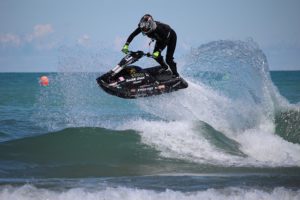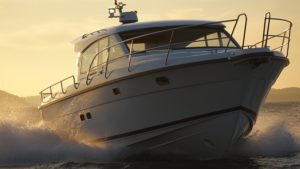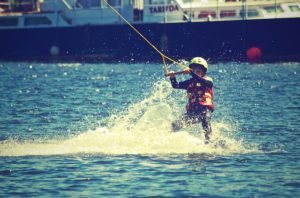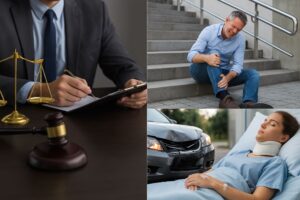Florida has more boating accidents than any other state, and this is not surprising. After all, it is surrounded by water on three sides and is well-known for recreational water activities. Still, if you are boating on Florida waters, it is important to understand the risk of personal injury while out on the water. For multiple reasons, you’re more likely to have a boating personal injury claim while boating on Florida waterways.
Reasons for Boating Personal Injury Claims

There are many reasons for boating accidents, and some of them are neither intentional nor the fault of the person driving the boat. Accidents do happen, but typically, these are the reasons:
Boating Under the Influence (BUI):
Don’t drink in drive, but also, don’t drink and boat. It is against the law to operate a watercraft while under the influence. How much is under the influence? In the State of Florida, law enforcement considers an alcohol concentration of .08% or higher to be under the influence. Other drug impairments do not have specific allowances. If a substance impaired your normal bodily functions during and after the accident, failing a sobriety test may be all it takes for law enforcement to give a Boating Under the Influence (BUI) charge.
 Distracted Boating:
Distracted Boating:
It can be difficult to remain focused while boating, but it is your responsibility as the controller of a watercraft to do so. The safety of yourself and your passengers depend on it. If there are water skiers or stand-up jet skiers doing flips and spins, you have to keep your wits about you. Staring at amazing sunsets, daring water tricksters, or even the people on the boat can be a major distraction. If you take your eyes off the surrounding water for a minute, you may not be able to prevent an accident.
Ignorance of Navigation Rules:
Waterways are not just for recreation. You actually need to treat them like streets and highways in order to keep all boats safe. Know which types of vehicles are give-way vessels in certain situations, and know the proper direction to give way. Boaters should learn this in a boater’s education class. In Florida, regulations require a Boating Safety Identification Card for legal operation of a boat of ten horsepower or more. This serves as a license to drive a boat, and it gives all boaters the opportunity to learn the rules of the water.
Equipment Breakdown:
Improper maintenance or use of a watercraft can result in breakdown. If you are travelling at high speed when the breakdown occurs, you could cause a crash. Even if you are still and can’t get your watercraft to start, you could have an accident by drifting into another watercraft, structure, rocks, or beach-side hazards. This is one of many reasons it is important to keep oars on your watercraft when appropriate along with safety gear such as life jackets in case your watercraft ends up sinking.
Rough Water/Weather:
Lastly, rough water is a common reason for watercraft accidents. People go out on the water when their watercrafts are not large enough to handle the conditions, or they don’t return when weather turns, and they become trapped.
Florida Boating Accident Statistics

U.S. statistics often list Florida as the state with the highest amount of accidents. Recent statistics have not strayed from this trend (although they have been a bit lower than previous years).
According to a survey from the U.S. Coast Guard, Florida had 607 boat accidents in 2018. This is the lowest level since 2015. It’s also the highest number among the 50 states. Again, this doesn’t mean that people in Florida are operating boats more dangerously than anywhere else. It just means there’s a lot of opportunity for boating accidents because there is so much water. In the same manner, states with the least roads probably have the least motor vehicle accidents.
The significance of all of these boating accidents is that they harm people. In 2018, boating accidents caused 57 deaths and 297 injuries. That’s pretty significant.
How to Prevent Boating Injuries
People cannot prevent all injuries that can possibly occur on the water, but having life jackets definitely saves lives. So does having a fire extinguisher on board. A dive boat fire in California killed over 24 people in recent years.
Having safety equipment available may be useless if not everyone on board knows where it is and how to use it, so make sure you have a little safety instruction session before going out on the water. It is a true tragedy when a person cannot be rescued from falling from a vessel because the people on-board didn’t know where the life jackets were stored.
Boating Personal Injury Lawsuits in Florida
If you are injured or have a loved one die in a boating accident, you may have cause for a personal injury lawsuit. A lawsuit could be warranted if you or your loved one was injured because of the intentional or negligent act of another party.
Intentional vs. Negligent
When a person makes an intentional action with the purpose of hurting another person, there is typically a criminal case as well. Personal injury lawsuits are civil lawsuits, which means they attempt to compensate the injured party by awarding a judgement. It is the best attempt the courts have at making a person whole again.
When a person commits an act of negligence, it means that they neglected to act in a way that they should have acted. As a result, the negligent person injured somebody else. A good example of this in boating may be if a person neglected to maintain control of his or her watercraft, and it ran into another boat causing property damage. These are also civil cases, and there is sometimes no criminal element.
Contributory Negligence in Boating Personal Injury Cases
Sometimes, both parties are at-fault to some degree. Florida state courts call this contributory negligence. In these cases, the courts adjust damages based on how much the person’s own negligence contributed to the accident. For instance, maybe one person was negligent because he or she was driving while distracted, and the other party failed to maintain control of the boat. In 50/50 contributory negligence cases, there would be no award. If another party was 80 percent at fault, then he or she would be responsible for 80 percent of the compensation.
Types of Damages
The courts compensate those who are injured in an accident for their personal and property damage, but they also compensate them for pain and suffering. This is compensation for the emotional distress that one undergoes when healing or recovering from an accident. These are subjective losses, and the court must agree to a justifiable amount. This is how $5,000 in medical bills may turn into a $100,000 court award. The courts mean for personal injury claims to make the plaintiff whole again (as much as possible), and that means compensating for the time and trouble one has to suffer to recover.
Finding a Good PI Lawyer
If you have suffered a personal injury in a watercraft accident, and someone else was at least partially at-fault, you could have a civil case. Boating accidents happen for many reasons, but most are preventable. Typically, someone has to be doing something incorrectly in order for an accident to occur. If that person injures someone else in the process, they should have to pay for damages.
If you would like a no-obligation consult with an actual personal injury lawyer, contact Kirshner, Groff, and Diaz today.

